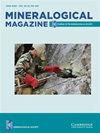西藏罗布萨蛇绿岩的Tennante-(Ni),Cu6(Cu4Ni2)As4S13:四面体群中的一个新的Ni成员
IF 1.4
3区 地球科学
Q2 MINERALOGY
引用次数: 0
摘要
摘要在西藏罗布萨铬铁矿中发现了一种新矿物tennantite-(Ni),Cu6(Cu4Ni2)As4S13。Tennante-(Ni)以二面体晶粒的形式出现,其尺寸范围为2至20μm。在反射光显微镜下,tennantite-(Ni)是各向同性的,呈现黄-绿-灰色。tennantite-(Ni)在空气中矿石矿物学委员会波长的反射率数据为:31.0(470 nm)、29.6(546 nm)、2.96(589 nm)和29.3(650 nm)。正模材料的电子探针分析给出了M(2)Cu6M(1)[Cu4.00(Ni0.97Cu0.53Fe0.50)∑2.00]∑6.00X(3)(As2.94Sb1.06)∑4S12.77的经验公式。Tennante-(Ni)是立方的,空间群I$\bar{4}$3m(#217),a=102.957(9)Å,V=109.14(3)Å3和Z=2。通过使用单晶X射线衍射,在163次独立反射[Fo>4σ(Fo)]的基础上,确定并细化了晶体结构,最终R1=0.0423。计算出的七条最强粉末X射线衍射线[d inÅ(I)(hkl)]分别为:2.972(100)(222)、1.820(83)(440)、2.574(28)(400)、1.552(18)(622)、3.640(10)(220)、1.880(10)和1.287(7)(800)。Tennante-(Ni)与其他四面体族矿物具有同构性,镍与Cu和少量Fe一起存在于四面体配位的M(1)位。该矿物及其名称已获得国际矿物学协会新矿物、命名和分类委员会(IMA2021-018)的批准。本文章由计算机程序翻译,如有差异,请以英文原文为准。
Tennantite-(Ni), Cu6(Cu4Ni2)As4S13, from Luobusa ophiolite, Tibet, China: a new Ni member of the tetrahedrite group
Abstract The new mineral tennantite-(Ni), Cu6(Cu4Ni2)As4S13, has been discovered from the Luobusa Chromitite, Tibet, southwestern China. Tennantite-(Ni) occurs as anhedral grains ranging from 2 to 20 μm in size. In reflected light microscopy, tennantite-(Ni) is isotropic and appears yellow-greenish grey. Reflectance data for Commission on Ore Mineralogy wavelengths in air for tennantite-(Ni) are: 31.0 (470 nm), 29.6 (546 nm), 29.6 (589 nm) and 29.3 (650 nm). Electron microprobe analysis for holotype material gave the empirical formula (on basis of total cations = 16 apfu): M(2)Cu6 M(1)[Cu4.00(Ni0.97Cu0.53Fe0.50)Σ2.00]Σ6.00X(3)(As2.94Sb1.06)Σ4S12.77. Tennantite-(Ni) is cubic, with space group I$\bar{ 4}$3m (#217), a =10.2957(9) Å, V = 1091.4(3) Å3 and Z = 2. By using single-crystal X-ray diffraction, the crystal structure has been determined and refined to a final R1 = 0.0423 on the basis of 163 independent reflections [Fo > 4σ (Fo)]. The calculated seven strongest powder X-ray diffraction lines [d in Å (I) (hkl)] are: 2.972 (100) (222), 1.820 (83) (440), 2.574 (28) (400), 1.552 (18) (622), 3.640 (10) (220), 1.880 (10) (521) and 1.287 (7) (800). Tennantite-(Ni) is isostructural with other tetrahedrite-group minerals, and nickel is hosted at the tetrahedrally coordinated M(1) site, along with Cu and minor Fe. The mineral and its name have been approved by the Commission on New Minerals, Nomenclature and Classification of the International Mineralogical Association (IMA2021-018).
求助全文
通过发布文献求助,成功后即可免费获取论文全文。
去求助
来源期刊

Mineralogical Magazine
地学-矿物学
CiteScore
4.00
自引率
25.90%
发文量
104
审稿时长
6-12 weeks
期刊介绍:
Mineralogical Magazine is an international journal of mineral sciences which covers the fields of mineralogy, crystallography, geochemistry, petrology, environmental geology and economic geology. The journal has been published continuously since the founding of the Mineralogical Society of Great Britain and Ireland in 1876 and is a leading journal in its field.
 求助内容:
求助内容: 应助结果提醒方式:
应助结果提醒方式:


